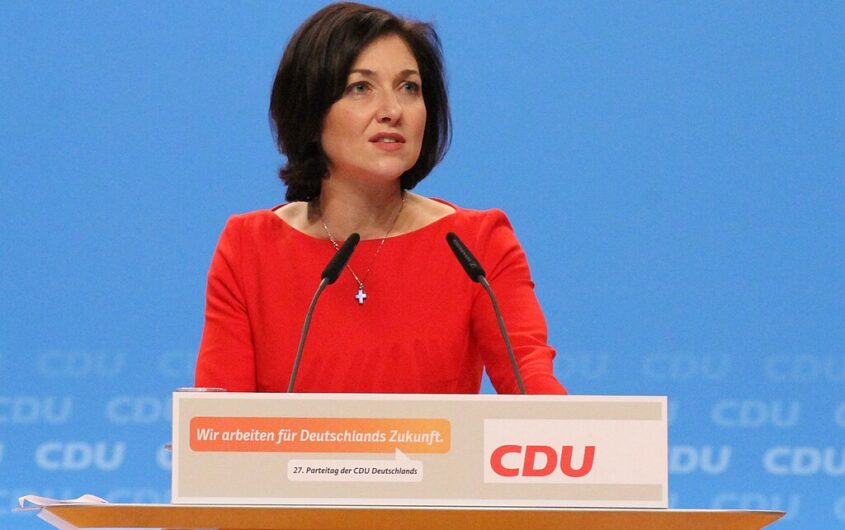
Olaf Kosinsky via Wikimedia Commons
AGI Profiles: Katherina Reiche

Frederik Fink
Halle Foundation/AGI Intern
Frederik Fink is a summer 2025 Halle Foundation Intern at the American-German Institute. Originally from Frankfurt, Germany, he recently completed a bachelor’s degree in history and international relations at King’s College London. His studies focused on the intersection between history and international politics as well as U.S. and UK foreign policy and national security and Russian politics and culture. His undergraduate thesis examined Germany’s policy toward the Western European Union (WEU), analyzing it through the lens of the agency-versus-structure dichotomy.
Frederik has a particular interest in the evolution of German foreign and security policy as well as the dynamics of German-U.S. relations. In 2022, he volunteered with Mission Siret, delivering humanitarian aid to southern Ukraine.
Federal Minister for Economic Affairs and Energy
On April 28, chancellor-in-waiting Friedrich Merz unveiled his cabinet. Alongside some unexpected nominations—such as Johann Wadephul as Foreign Minister and Karsten Wildberger as Minister for Digital Affairs—was a familiar CDU figure: Katherina Reiche. As the newly appointed Federal Minister for Economic Affairs and Energy, Reiche will be tasked with navigating Germany’s adjustment to an era of strategic competition amid global poly-crises.
A Return to the Roots?
The Federal Ministry for Economic Affairs and Energy (BMWE) has a history shaped by shifting priorities. Germany’s first economics minister Ludwig Erhard and his successors were followers of the ordoliberal school of economic thought, which posits that the state should create the conditions necessary for a functioning economic order to emerge and develop. However, it is not the state’s role to direct or control the economic process itself.[i] Although successive governments paid lip service to these tenets, they were gradually abandoned, and the ministry evolved into a “subsidy-machine.”
Katherina Reiche positions herself as the market-oriented conscience and ordoliberal force of the new government, advocating a reset of the ministry’s mission. In a speech to Die Familienunternehmer e.V., an association of family entrepreneurs in Germany, Reiche declared that “we need to enable more than we prescribe. We must not primarily regulate but activate.”
Early Life and Career
Reiche was born on July 16, 1973, in Luckenwalde, Brandenburg, and studied chemistry at the University of Potsdam. She entered politics in 1992 and was elected to the Bundestag in 1998, where she served for seventeen years. From 2005 to 2009, she was deputy chairwoman of the CDU/CSU parliamentary group and held two parliamentary state secretary posts in the environment and transport ministries. In the second Merkel cabinet (2009-2013), Reiche functioned as parliamentary state secretary in the Ministry for the Environment, Nature Conservation, and Nuclear Safety (BMUKN), where she also supported the use of nuclear energy. Though unusual among her party peers at the time, Reiche warned about the risks of exiting nuclear power without a backup plan. Her minister, Norbert Röttgen, assigned her a broad portfolio that spanned several key areas within the ministry. She assisted in matters related to climate policy, particularly international cooperation, as well as renewable energy, international legal affairs, and national and international climate protection efforts. Additionally, she worked on issues involving water management, the waste industry, environmental remediation, resource efficiency, and soil protection. She also oversaw the sub-section on chemical safety (IG II). From 2012 until the federal election in 2013, Reiche was tasked with overseeing all matters related to the Renewable Energy Sources Act (EEG) and the impact of the energy transition on small- and medium-sized enterprises (SMEs). She reviewed any submissions on this topic before they reached the minister. In the subsequent legislative period, she was appointed once again as parliamentary state secretary in the Ministry for Transport and Digital Infrastructure (2014-2015). Minister Alexander Dobrindt assigned her to supervise efforts including traffic safety, the automotive industry, and research on fuel strategy and electromobility.
Reiche’s fifteen years in national politics, however, were not without turbulence. In 2002, during Edmund Stoiber’s (Christian Social Union, CSU) chancellor campaign, she was named shadow minister for family affairs, sparking criticism from conservative factions due to her status as an unmarried mother. Reiche faced strong backlash for linking Germany’s declining birth rate to the legal equality of same-sex marriages. Critics within her own party, including Jens Spahn, himself in a same-sex marriage and now chairman of the CDU/CSU parliamentary group, condemned the remarks as exclusionary.
Reiche left politics in 2015 to become CEO of the German Association of Local Public Utilities (VKU), a move that reignited debate over mandatory waiting periods for politicians before entering the private sector. At the time, she wrote to her party colleagues that she was “very much looking forward to this exciting and challenging role,” citing her long-standing interest in energy, climate, and environmental policy as her motivation for the career change Following her time at the VKU, Reiche became CEO of the energy utility and grid operator Westenergie, a subsidiary of E.ON, one of Europe’s biggest energy companies. During her tenure, she built a strong reputation as an effective manager and oversaw a significant increase in the company’s revenue.
A Policy of Technological Openness
Katherina Reiche brings notable scientific and private sector experience to her new role, in contrast to many of her predecessors, who were lawyers and career politicians. The German Association for Small and Medium-Sized Enterprises described her as well-connected, pragmatic, and capable of radiating optimism about the future. Former colleagues describe her as “diligent, tough, and very knowledgeable in economic matters” and an expert regarding key issues in the energy sector and economy. The chancellor introduced her nomination by saying that it is time to “finally start making economic policy in Germany again.” Reiche cited Germany’s deep economic crisis as her motivation for returning to public office, saying, “When the chancellor offered me the office, my sense of duty prevailed over my personal life plan. I consider it an honor to be able to serve my country.” Her personal credo is that “multiple crises require multiple transformations.”
Reiche quickly asserted her own direction in the ministry. She replaced many of her predecessor’s senior staff and announced a comprehensive “reality check” of her predecessor’s energy policy. She has suggested that Germany might be better off pushing its 2045 target for carbon-neutrality back to 2050, which is the EU’s agreed target, a statement that contradicts the coalition agreement and that sparked immediate criticism from the SPD. Reiche intends to prioritize technological openness over targeted subsidies and is skeptical about regulation. Reiche stresses that energy strategy should promote growth and bring together supply security, climate protection, and affordability “in a balanced triangle.”
To achieve this, Reiche will lobby in Brussels alongside other member states for an extension and expansion of the electricity price compensation to relieve energy-intensive companies and provide them with planning security. In practical terms, Reiche plans to auction off five to ten gigawatts of new gas plant capacity by the end of this year. However, this plan has attracted renewed regulatory scrutiny from Brussels. Ahead of the Bundestag’s summer recess, she and her cabinet colleagues intended to present a relief package featuring electricity tax cuts (to the EU minimum), lower grid charges, and energy price reductions. However, in the preliminary budget for 2025, the electricity costs remain unchanged for households and small firms.
Her ministry also plans to launch Zukunftsfonds II, a fund for deep-tech and future-oriented innovation, and to streamline the burdensome reporting requirements of the Supply Chain Due Diligence Act. Additionally, Reiche wants to advocate for comprehensive corporate tax reform, which, as outlined in the coalition contract, will not start until 2028.
Beyond national policy, the economics minister identifies Europe’s most pressing trade agenda item as the urgent de-escalation of trade tensions with the United States. “We are an export nation,” she remarked recently, “and the United States remains our most important trading partner.” The tariffs implemented under President Trump and the initial negotiation deadline on July 9 were also the key reasons for her inaugural visit to Washington over the Juneteenth weekend.
Critics
Reiche faces criticism from keepers of the free-market flame, who reject state intervention in the economy, as well as from those who accuse her of abandoning the renewable-energy transformation that was at the heart of the Scholz government’s priorities. Despite these critics, Reiche defends her approach as pragmatic. The current emphasis on an industrial electricity price is, as she notes, a temporary solution to ensure competitive prices. Although she has been accused of backing away from Germany’s national hydrogen strategy, Reiche has chaired Germany’s National Hydrogen Council since 2020, promoting hydrogen production as the key technology for industry and heavy transport. Currently, many key components for hydrogen plants are scarce and prohibitively expensive, rendering large-scale deployment unfeasible in the short term. In her view, hydrogen will become a viable option in the 2030s once the technology matures and costs fall.
The cooperation between Reiche and her counterpart at the Ministry for the Environment, Carsten Schneider (SPD), will be a key test for her agenda. The two disagree on whether energy policy should prioritize supply security or the accelerated expansion of renewable energy. Although Schneider has acknowledged the importance of supply security, he has also challenged Reiche’s strategy, arguing that expanding renewables is the most effective way to reduce electricity prices—and should, therefore, take precedence.
Roadblocks Ahead
The broader context compounds the challenges ahead. First, the Ministry for Economic Affairs and Energy has lost control over several key domains—transformation, climate protection, space policy, and industrial innovation projects, such as gigafactories—all of which have been reassigned to other ministries as part of the coalition agreement. Additionally, oversight of the 25-billion-euro Climate and Transformation Fund (KTF), which was a key source of influence for Reiche’s predecessor, Robert Habeck, has been transferred to the Ministry of Finance, and the allocated annual budget for her ministry amounts only to 1.79 percent of the budget (€8.98 billion compared to €11 billion in 2024). This reduces her power in relation to other cabinet members.
Nevertheless, it will fall to Katherina Reiche and Friedrich Merz to restore confidence and reposition Germany’s economy. She inherits not only a ministry stripped of key powers but a national economy shaped by years of ideological adventurism. To succeed, Reiche must confront state overreach, counterbalance the unchecked expansion of the welfare state, and champion a renewed ethos of individual responsibility—while placing the rediscovery of national economic confidence at the heart of her agenda. Yet, she is fully cognizant of these responsibilities. As she put it herself: “To prevail in the systemic competition—that ought to be our [the ministry’s] assignment.” Having served as vice-chair of the CDU/CSU parliamentary group and as parliamentary state secretary in two ministries, she earned a reputation as technically sound and not ideologically charged. Her time in the private sector was very successful. Her political experience aided her when she moved to the intersection between local communities, politics, and private companies, where she led the Association of Local Public Utilities as a trusted voice for municipal utilities and expanded it into new areas. Similarly, her tenure at Westenergie has been critical in veering the electricity and gas operator toward hydrogen. She is well-positioned to provide effective leadership at the economics ministry, where her ordoliberal convictions and extensive executive experience and skill are expected to guide her approach and bring Germany back on track.
[i] Philip Manow, “Ordoliberalismus Als Ökonomische Ordnungstheologie,” Leviathan 29, no. 2 (2001): 179–98.







